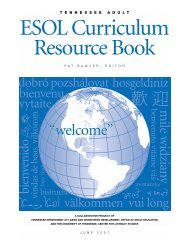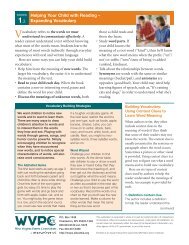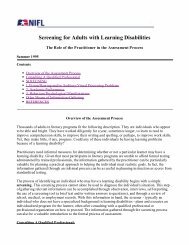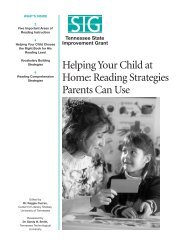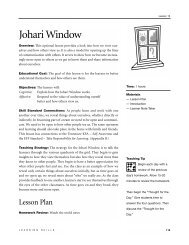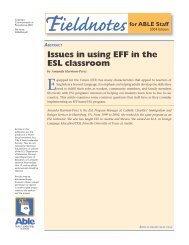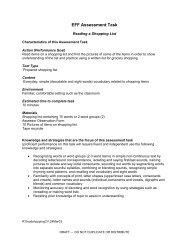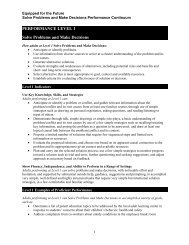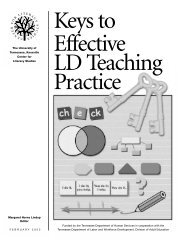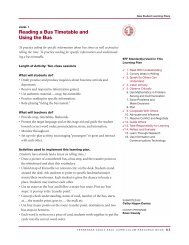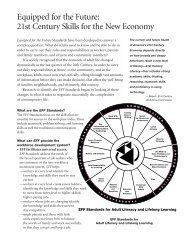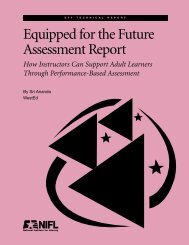Building Bridges Between School and Home - Center for Literacy ...
Building Bridges Between School and Home - Center for Literacy ...
Building Bridges Between School and Home - Center for Literacy ...
- No tags were found...
Create successful ePaper yourself
Turn your PDF publications into a flip-book with our unique Google optimized e-Paper software.
Appendix IIWorking With Teachers <strong>and</strong> <strong>School</strong>sParents provide the primary support <strong>for</strong>, <strong>and</strong>are the main source of in<strong>for</strong>mation about,their children. It’s the responsibility of bothteachers <strong>and</strong> parents to help students succeed. Followingare some tips <strong>for</strong> working with your child’steachers <strong>and</strong> other school staff.• Learn everything you can about your child’sschool. The more you know, the easier your jobas a parent will be. Be sure to read <strong>and</strong> discuss thestudent h<strong>and</strong>book with your child.• Access the school Web site. In<strong>for</strong>mation aboutschedules of events, names of people to contact,rules <strong>and</strong> regulations is provided.http://lcss.us/schools/ISES/• If your schedule permits, attend PTO meetings.Parent Guide• Talk with your child’s teacher early <strong>and</strong> often.Get acquainted <strong>and</strong> show your interest.• If you notice a big change in your child’s behavior,school per<strong>for</strong>mance, or attitude during theschool year, contact the teacher immediately.• If you notice your child is having trouble witha school subject, contact the teacher to find outhow you can help.• Don’t go to the principal without first givingthe teacher a chance to work out the problemwith you <strong>and</strong> your child.• If you disagree with a decision at school concerningyour child, do not “bad mouth” theschool in front of your child. Talk with the properpeople at school immediately, <strong>and</strong> be open <strong>and</strong>honest.Conferences can be a good opportunity toshare in<strong>for</strong>mation about your child. Followingare some tips <strong>for</strong> successful parentteacherconferences.• Believe that the teacher wants to help you <strong>and</strong>your child, even if you disagree about something.• Be prepared to listen as well as to talk. It helpsto write down ahead of time what you want todiscuss with the teacher.• If you don’t underst<strong>and</strong> something the teacheris saying, tell him/her.• If English is your second language, you mayneed to make special arrangements, such asincluding in the meeting someone who is bilingual.• Tell the teacher if you think your child needsParent-Teacher Conferencesspecial help, <strong>and</strong> about any special family situationor event that might affect your child’s abilityto learn.• Talk about your child’s talents, skills, hobbies,study habits <strong>and</strong> any special concerns, such assensitivities about weight or speech difficulties.• Ask about specific ways to help your child athome.• If you don’t agree with a teacher’s policy, don’targue with the teacher in front of your child.Set up a meeting to talk about the issue. Try tobe positive <strong>and</strong> remain calm.• If at all possible, do not bring other children tothe conference.• If both parents are involved in the child’s life,both should make arrangements to attend. Itwill send a loud <strong>and</strong> strong message to the childconcerning the importance of school.BUILDING BRIDGES BETWEEN SCHOOL AND HOME: STORIES OF SUCCESS FROM LAWRENCE COUNTY, TENNESSEE16



